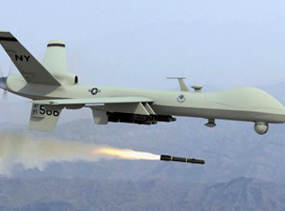- Subscribe to PCF Networked Blog Daily Updates
- Subscribe to our Twitter / Google / Yahoo Daily Updates
 New Delhi: The government said it has begun using unmanned aerial vehicles in
Naxal-affected areas of the country. "Yes, madam," Minister of State for
Home Jitendra Singh told the Lok Sabha in a written reply.
New Delhi: The government said it has begun using unmanned aerial vehicles in
Naxal-affected areas of the country. "Yes, madam," Minister of State for
Home Jitendra Singh told the Lok Sabha in a written reply.
The minister, however, said, "It is too
early to make an assessment on the effectiveness of unmanned aerial
vehicles deployed in Left-wing extremism-affected areas." The biggest
threat to the general election does not come from terrorists in Jammu
and Kashmir with their Kalashnikovs and rocket-launchers.
It is the spectre of Maoist violence that
is worrying security agencies. Thousands of central and state security
personnel will be stretched to their limit during the election as they
fight a cat and mouse game with men and women who still swear by the
dream of proletariat rule. Maoist or Naxalite violence is of serious
concern in 12 of India's biggest states.
The Naxalites, also sometimes called the
Naxals, is a loose term used to define groups waging a violent struggle
on behalf of landless labourers and tribal people against landlords and
others. The Naxalites say they are fighting oppression and exploitation
to create a classless society. Their opponents say the Naxalites are
terrorists oppressing people in the name of a class war.
Last year Naxalites accounted for nearly
88 percent of organised violence and killings in the country. Who do
they represent? The Naxalites claim to represent the most oppressed
people in India, those who are often left untouched by India's
development and bypassed by the electoral process. Invariably, they are
the Adivasis, Dalits, and the poorest of the poor, who work as landless
labourers for a pittance, often below India's mandated minimum wages.
Andhra Pradesh, Bihar, Jharkhand and
Chhattisgarh are the worst affected; Madhya Pradesh, Maharashtra,
Orissa, Uttar Pradesh and West Bengal are partially affected.
(news24online)
Xharaf Vsm
Pakistan Cyber Force
![Pakistan Cyber Force [Official]](http://feeds.feedburner.com/PakistanCyberForce.2.gif)


